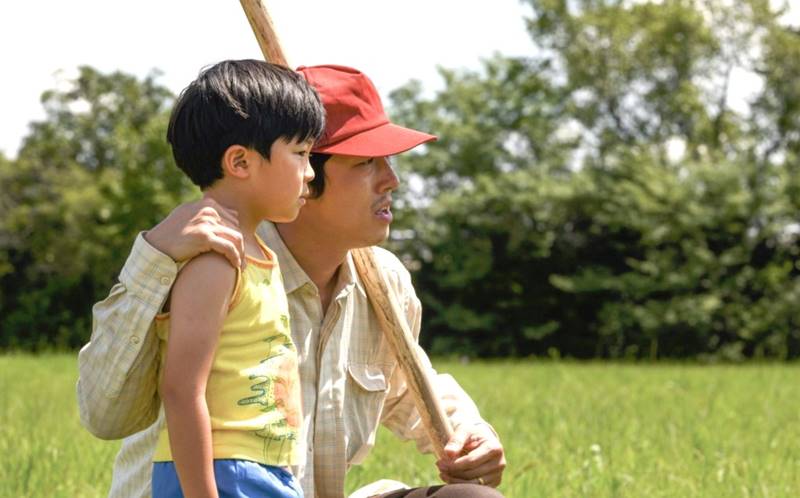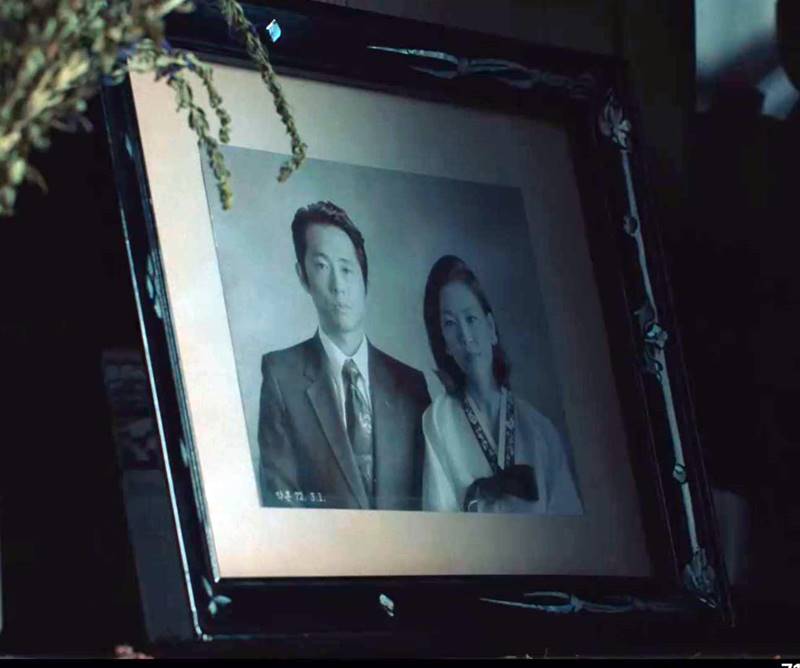
By Jae-Ha Kim
Teen Vogue (and archived on Substack)
February 12, 2021
☆☆☆☆
Jacob Yi (played by Steven Yeun)
Monica Yi (played by Han Ye-ri)
David Yi (played by Alan Kim)
Anne Yi (played by Noel Kate Cho)
Soon-ja (played by Youn Yuh-jung)
↑Note: Korean names denote the surname followed by the given name.
For many children of immigrants, it can be humbling and almost unbearable to think about how much of our happiness is derived from our parents’ suffering. Koreans might categorize this uneasy feeling as han — a word that encapsulates the feeling of sorrow, resentment, and hope that has built up over generations.
Lee Isaac Chung’s beautifully-nuanced and semi-autobiographical film Minari offers a subtle release from that guilt. While it’s a specific story about one Korean American family, it also is a universal tale about everyone who has dreamed for a better future.
Jacob Yi (Steven Yeun) is positive that 50 acres of Arkansas farmland is the key to his family’s success. He will grow Korean vegetables on his farm, and he and his wife, Monica (Han Ye-ri), will continue to work as chicken sexers at the local factory. In a few years, after his farm turns a profit, they’ll quit their jobs and work full-time as farmers.
The problem is, he never told Monica this when they moved from their home in California. As she silently looks around their new home – a squalid trailer whose previous owner died by suicide – her face reveals her worries. The roof leaks. There is no Korean community nearby. And, most importantly, they are far removed from the nearest hospital, which is a necessity for their youngest child, David – a precocious seven-year-old moppet with wise eyes and a faltering heart.

David (Alan S. Kim) is Chung’s fictionalized alter ego. The only member of the Yi family who was born in the United States, he is an adaptable child who is befriended immediately at church by a boy who wants to know why David’s face is so flat. Likewise, his older sister, Anne (Noel Kate Cho), draws the attention of a girl whose ching chong introduction is less of an intentional racist barb than an ignorant microaggression.
At home, the siblings have become accustomed to hearing their parents argue loudly over money. David gets it into his head that his maternal grandmother — who he has never met — is somehow to blame. When he learns that she will be moving from Korea to take care of him while his parents work, he is filled with dread. Not only is he wary of having a stranger move into his life, but he also doesn’t want to share his room with her.
When Soon-ja (Youn Yuh-jung) arrives from Korea bearing gifts like gochugaru (spicy red pepper powder) and myeolchi (salted and dried anchovies), David is as disappointed as Monica is elated. Soon-ja is not like any of the grandmas from the 1980s television shows that had indoctrinated his young life. Where are the home-baked cookies? More importantly, he complains that she smells like Korea — a scent he can’t possibly know.
Soon-ja could’ve taken offense at his insults, but she laughs them off. She is amused by his antics and gives him leeway to become accustomed to her. Even after an incident when David intentionally serves her a disgusting drink to retaliate against the pungent medicine she brews for him daily, she can’t bear to see him punished. “Who cares if I drank it?” she tells Jacob, who is preparing to discipline the child. “It was fun!”
David is too young to understand that Soon-ja survived by herself in Korea. Widowed at an early age and with no son to take care of her, she provided for herself. And yet when she arrived in the U.S., she gave all her savings to Monica, who is embarrassed that she hasn’t been able to help her mother financially.
This has been a long-brewing source of contention for the Yis. They worked long hours in factories, but have no savings to show for it — not because they didn’t have money to put aside, but because Jacob sent it all to his parents. None of it was sent to Monica’s mother or put aside for their children.
“I’m the oldest son!” he tells her. “I have no choice.”
Monica’s frustration and anger is visible. But there’s not much she can say, because Korean women of her era knew going into marriage that it’s an eldest son’s duty to provide for his aging parents, even at his own nuclear family’s expense. I saw this occur in my own family. But where my mother differed from Monica is that she took charge of our finances, fulfilling my father’s duties as the eldest son while ensuring that there would be money saved for our college education.
As with many dreams before they are fulfilled, the Yi family live through nightmares that at times seem insurmountable. In an attempt to save money, Jacob dug his own well for his farm. When it dried up, he connected the crop irrigation to his home, which left the family with no water. Even when it’s obvious what has happened, he doesn’t confide in his wife.
Having survived much worse conditions during the Korean War, Soon-ja views this as a minor inconvenience. She takes David to the riverbank where they had planted minari – a Korean vegetable that flourishes with little fuss – and brings home buckets of water for the family to boil and use.
Earlier, she had told David and Anne not to scare away snakes at the riverbank, because they can be more dangerous to humans when they’re hidden from view. This is a recurring theme in Minari, with Jacob and Monica hiding their fears from one another, thinking it’s for the best to pretend they are unaware of what’s going on.

Chung is an astute filmmaker, who pays close attention to the smallest details. He has created a universally relatable film, while inserting elements that are specifically Korean. For instance, we never hear the parents use their Korean names. They introduce themselves as Jacob and Monica to the white congregation at church. But at home, they refer to each other as their children’s mother or father, as is customary for Koreans. Occasionally, they use yeobo — a Korean word that has morphed into a term of endearment between couples, but is an abbreviation for look here — which implies they are talking to a person who they take for granted will always be there for them.
Like most children, David and Anne are like the minari Soon-ja planted. They adapt well to their new surroundings without overthinking it. They’re friendly with the town’s religious outcast, because he works for their dad. They acclimate to Soon-ja, because they have to. They live where they live, because it’s where their parents chose.
Soon-ja also is resilient and never complains about their living conditions. She amuses herself by watching pro wrestling on TV. And when she hears her grandson complain that she’s not like other grandmas, she chooses to put a positive spin on it: You like grandma? Thank you! Yes, she could’ve misunderstood his words, but she understood the intended tone, just fine.
After the Korean War ended, but before South Korea built itself into an economic powerhouse known for its technology, BBQ and K-pop, my parents dreamed about immigrating to the United States, too. Migook, as the U.S. is known in Korea, literally translates into beautiful country. It is a nation full of wealthy and fair-minded Americans, they promised us. It had paved roads and was so clean that no one would dare spit on the streets like they did in Korea. America would give us opportunities we wouldn’t have back home.
Of course, this idealized version of America didn’t exist for us, just as it didn’t for the Yis. But what did exist was enough for us to grab onto and flourish.
Minari opens in select theaters on Feb. 12. A limited number of tickets for online viewing also are available for purchase at https://screeningroom.a24films.com/, prior to a VOD release on Feb. 26.






such a gorgeous piece from @GoAwayWithJae for @TeenVogue ❤
This is such a beautiful review with a touch of your own experience which makes it even more meaningful. I am so excited to watch Minari
Wow Jae. This was such a beautiful writeup! I could tell the time and effort spent. Was just enuf intro of story plot, just enuf cultural ref and just enuf ref to self experiences. Hope ur works and movies like this get more recognition for Asian excellence. 💜💜💜
Thank you so much for sharing! I watched the movie last night. Your review made me tear up thinking about the movie again. The movie is so beautiful and relatable in many ways. You were able to summarize it quite well ❤ Also, didn’t know that 미국 had that direct translation. I do find that ironic. Seeing as how South Korea developed into the powerhouse that it is now. And as a child of immigrant parents, I’ve seen how far from good moving to the US has treated my parents at times.
“For many children of immigrants, it can be humbling and almost unbearable to think about how much of our happiness is derived from our parents’ suffering.” Thanks @GoAwayWithJae for this insightful review of Minari.
” For many children of immigrants, it can be humbling and almost unbearable to think about how much of our happiness is derived from our parents’ suffering.” Beautiful review, @GoAwayWithJae